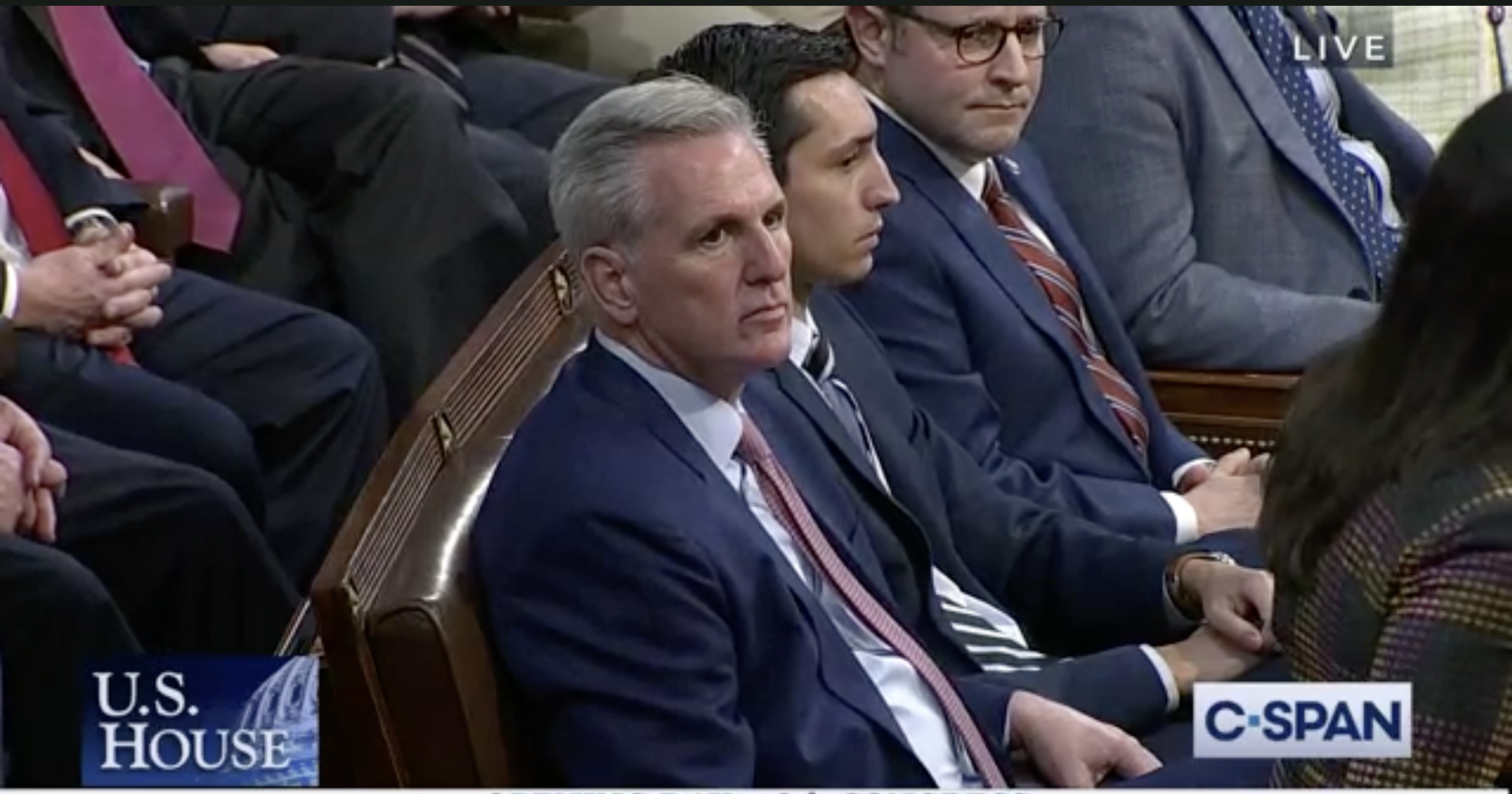Congress
McCarthy suffers humiliating losses in bid for House speakership
19 Republicans decline to support longtime party leader

(UPDATE 4:45 p.m.: Kevin McCarthy lost his bid for House Speaker in second- and third-round voting Tuesday afternoon. Further rounds of voting are expected to continue late into the night.)
Republicans in the U.S. House of Representatives declined to elect Rep. Kevin McCarthy (R-Calif.) as House Speaker for the 118th Congress during a decisive floor vote on Tuesday afternoon.
Nineteen GOP members declined to cast their ballots for McCarthy, who could only lose four votes from the Republican caucus given the party’s slim majority control of the House.
McCarthy’s loss, which marks the first time since 1923 in which a speaker had not been seated after the first vote, means additional floor votes will be necessary to determine who will hold the gavel for the Republican House majority.
The delays may prove costly, because without a speaker, the House is unable to adopt rules, make committee assignments, or move on any legislation. It was only after nine ballots over the course of two months that a speaker was seated in 1923.
Leading up to Tuesday’s vote, as many as 20 GOP members had not publicly endorsed McCarthy. Among those were five members who were staunchly opposed – all belonging to the ultraconservative House Freedom Caucus, including Rep. Andy Biggs of Arizona, who challenged McCarthy for the Speaker’s gavel on the floor Tuesday.
Biggs ultimately won 10 GOP votes, with others casting their ballots for Republican Reps. Jim Jordan (Ohio), Jim Banks (Ind.), Byron Donalds (Fla.), and Lee Zeldin (R-Ny.).
Other members of the Republican caucus who were less calcified in their opposition to McCarthy had conditioned their support on winning concessions, from promises regarding membership on standing committees to procedural agreements that would limit the power of the speakership.
Most important was a compromise struck ahead of the vote that would have allowed five members to file for a motion to vacate the speakership at any time, bringing back a House rule that cost John Boehner his speakership in 2015.
McCarthy served as House Majority Leader from 2014 to 2019 under Speakers Boehner and Paul Ryan, who both lost their gavels because of their resistance to the demands of the Freedom Caucus.
By contrast, McCarthy has embraced the most conservative members of the GOP caucus, earning support from the likes of Rep. Marjorie Taylor Greene (Ga.).
According to media reports, in a closed-door meeting with Republican members on Tuesday morning that preceded the floor vote, McCarthy delivered a defiant speech in which he refused to make additional concessions to the ultraconservative holdouts and told his colleagues, “I earned this job.”
Representative Lauren Boebert (Colo.) reportedly shouted, “Bullshit!”
Speaking with reporters after the closed-door meeting, Greene admonished the members of her caucus who opposed McCarthy’s speakership.
During the meeting, she said, “we found out that there were several members – three, in fact – that went in last night and were demanding positions for themselves. Demanding gavel positions, demanding subcommittees, demanding for people to be taken off committees for people to be put on committees.”
Greene noted that she had not conditioned her support for McCarthy on winning any concessions for herself, despite having been stripped of her committee assignments in 2021. “This is about electing someone to serve in the speaker’s chair so that we can get to work,” she said.
The congresswoman added that “the conservatives who our base believes in, let me remind everyone: They’re not perfect either. Scott Perry [Pa.], before his general election, refused to vote against the gay marriage bill [the Respect for Marriage Act]…Then, when it came back around after his election, he was able to vote against it. Conservatives would not like that.”
Embattled freshman Republican Rep. George Santos (N.Y.) also cast his vote for McCarthy on Tuesday, having evaded reporters who were gathered this morning in front of his office in the Longworth House building.
A series of news reports over the past few weeks revealed the congressman had lied about nearly every part of his life, education, identity, and career, while his alleged financial malfeasance has triggered investigations by federal and local prosecutors.
The latest news published by The New York Times on Monday was the revival of fraud charges against Santos by authorities in his native Brazil who formally requested that the U.S. Department notify him of the charges.

Congress
Congress passes ‘Big, Beautiful Bill’ with massive cuts to health insurance coverage
Roughly 1.8 million LGBTQ Americans rely on Medicaid

The “Big, Beautiful Bill” heads to President Donald Trump’s desk following the vote by the Republican majority in the U.S. House of Representatives Thursday, which saw two nays from GOP members and unified opposition from the entire Democratic caucus.
To partially offset the cost of tax breaks that disproportionately favor the wealthy, the bill contains massive cuts to Medicaid and social safety net programs like food assistance for the poor while adding a projected $3.3 billion to the deficit.
Policy wise, the signature legislation of Trump’s second term rolls back clean energy tax credits passed under the Biden-Harris administration while beefing up funding for defense and border security.
Roughly 13 percent of LGBTQ adults in the U.S., about 1.8 million people, rely on Medicaid as their primary health insurer, compared to seven percent of non-LGBTQ adults, according to the UCLA School of Law’s Williams Institute think tank on sexual orientation and gender identities.
In total, the Congressional Budget Office estimates the cuts will cause more than 10 million Americans to lose their coverage under Medicaid and anywhere from three to five million to lose their care under Affordable Care Act marketplace plans.
A number of Republicans in the House and Senate opposed the bill reasoning that they might face political consequences for taking away access to healthcare for, particularly, low-income Americans who rely on Medicaid. Poorer voters flocked to Trump in last year’s presidential election, exit polls show.
A provision that would have blocked the use of federal funds to reimburse medical care for transgender youth was blocked by the Senate Parliamentarian and ultimately struck from the legislation — reportedly after the first trans member of Congress, U.S. Rep. Sarah McBride (D-Del.) and the first lesbian U.S. senator, Tammy Baldwin (D-Wis.), shored up unified opposition to the proposal among Congressional Democrats.
Congress
Ritchie Torres says he is unlikely to run for NY governor
One poll showed gay Democratic congressman nearly tied with Kathy Hochul

Gay Democratic Congressman Ritchie Torres of New York is unlikely to challenge New York Gov. Kathy Hochul (D) in the state’s next gubernatorial race, he said during an appearance Wednesday on MSNBC’s “Morning Joe.”
“I’m unlikely to run for governor,” he said. ““I feel like the assault that we’ve seen on the social safety net in the Bronx is so unprecedented. It’s so overwhelming that I’m going to keep my focus on Washington, D.C.”
Torres and Hochul were nearly tied in a poll this spring of likely Democratic voters in New York City, fueling speculation that the congressman might run. A Siena College poll, however, found Hochul leading with a wider margin.
Back in D.C., the congressman and his colleagues are unified in their opposition to President Donald Trump’s signature legislation, the “Big Beautiful Bill,” which heads back to the House after passing the Senate by one vote this week.
To pay for tax cuts that disproportionately advantage the ultra-wealthy and large corporations, the president and Congressional Republicans have proposed massive cuts to Medicaid and other social programs.
A provision in the Senate version of the bill that would have blocked the use of federal funds to reimburse medical care for transgender youth was blocked by the Senate Parliamentarian and ultimately struck from the legislation, reportedly after pressure from transgender U.S. Rep. Sarah McBride (D-Del.) and lesbian U.S. Sen. Tammy Baldwin (D-Wis.).
Torres on “Morning Joe” said, “The so-called Big Beautiful Bill represents a betrayal of the working people of America and nowhere more so than in the Bronx,” adding, “It’s going to destabilize every health care provider, every hospital.”
Congress
House Democrats oppose Bessent’s removal of SOGI from discrimination complaint forms
Congressional Equality Caucus sharply criticized move

A letter issued last week by a group of House Democrats objects to Treasury Secretary Scott Bessent’s removal of sexual orientation and gender identity as bases for sex discrimination complaints in several Equal Employment Opportunity forms.
Bessent, who is gay, is the highest ranking openly LGBTQ official in American history and the second out Cabinet member next to Pete Buttigieg, who served as transportation secretary during the Biden-Harris administration.
The signatories to the letter include a few out members of Congress, Congressional Equality Caucus chair and co-chairs Mark Takano (Calif.), Ritchie Torres (N.Y.), and Becca Balint (Vt.), along with U.S. Reps. Nikema Williams (Ga.), Hank Johnson (Ga.), Raja Krishnamoorthi (Ill.), Delia Ramirez (Ill.), Joyce Beatty (Ohio), Lloyd Doggett (Texas), Eleanor Holmes Norton (D.C.), Josh Gottheimer (N.J.), and Sylvia Garcia (D-Texas).
The letter explains the “critical role” played by the EEO given the strictures and limits on how federal employees can find recourse for unlawful workplace discrimination — namely, without the ability to file complaints directly with the Employment Opportunity Commission or otherwise engage with the agency unless the complainant “appeal[s] an agency’s decision following the agency’s investigation or request[s] a hearing before an administrative judge.”
“Your attempt to remove ‘gender identity’ and ‘sexual orientation’ as bases for sex discrimination complaints in numerous Equal Employment Opportunity (EEO) forms will create unnecessary hurdles to employees filing EEO complaints and undermine enforcement of federal employee’s nondiscrimination protections,” the members wrote in their letter.
They further explain the legal basis behind LGBTQ inclusive nondiscrimination protections for federal employees in the EEOC’s decisions in Macy v. Holder (2012) and Baldwin v. Foxx (2015) and the U.S. Supreme Court’s decision in Bostock v. Clayton County (2020).
“It appears that these changes may be an attempt by the department to dissuade employees from reporting gender identity and sexual orientation discrimination,” the lawmakers wrote. “Without forms clearly enumerating gender identity and sexual orientation as forms of sex discrimination, the average employee who experiences these forms of discrimination may see these forms and not realize that the discrimination they experienced was unlawful and something that they can report and seek recourse for.”
“A more alarming view would be that the department no longer plans to fulfill its legal obligations to investigate complaints of gender identity and sexual orientation and ensure its
employees are working in an environment free from these forms of discrimination,” they added.
-

 U.S. Supreme Court3 days ago
U.S. Supreme Court3 days agoSupreme Court to consider bans on trans athletes in school sports
-

 Out & About3 days ago
Out & About3 days agoCelebrate the Fourth of July the gay way!
-

 Virginia3 days ago
Virginia3 days agoVa. court allows conversion therapy despite law banning it
-

 Maryland5 days ago
Maryland5 days agoLGBTQ suicide prevention hotline option is going away. Here’s where else to go in Md.










